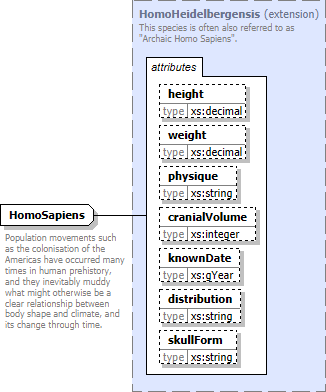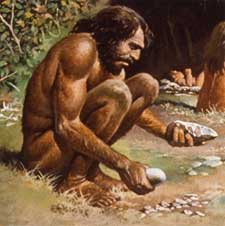
Namespace: |
http://www.geocities.com/palaeoanthropology |
Content: |
empty, 7 attributes |
Defined: |
globally in HumanEvolution.xsd; see XML source |
Used: |
never |

XML Representation Summary |
||||||||||||||||||||||
<... |
||||||||||||||||||||||
|
||||||||||||||||||||||
/> |
||||||||||||||||||||||
 Population movements such as the colonisation of the Americas have occurred
many times in human prehistory, and they inevitably muddy what might otherwise
be a clear relationship between body shape and climate, and its change through
time. One important example relates to the issue of the origin of modern humans.
Many anthropologists believe that anatomically modern Homo sapiens
evolved from a small population in Africa 200,000 years ago, and then spread
into the rest of the Old World, reaching western Europe only 35,000 years ago.
This is known as the
"Out of Africa"
hypothesis. However, if this was true, the African origin of anatomically
modern humans would be reflected in their body and limb proportions.
Indeed, such populations do show this trend, as these tall,
long-limbed people entered lands located at a latitude more conducive
to wide bodies and short limbs.
Population movements such as the colonisation of the Americas have occurred
many times in human prehistory, and they inevitably muddy what might otherwise
be a clear relationship between body shape and climate, and its change through
time. One important example relates to the issue of the origin of modern humans.
Many anthropologists believe that anatomically modern Homo sapiens
evolved from a small population in Africa 200,000 years ago, and then spread
into the rest of the Old World, reaching western Europe only 35,000 years ago.
This is known as the
"Out of Africa"
hypothesis. However, if this was true, the African origin of anatomically
modern humans would be reflected in their body and limb proportions.
Indeed, such populations do show this trend, as these tall,
long-limbed people entered lands located at a latitude more conducive
to wide bodies and short limbs.
It is mostly agreed on the overall anatomical and behavioural shifts that accompanied the evolutionary transformation from Homo erectus to Homo sapiens. Anatomically, it involved a decrease of skeletal and dental robusticity, modifications of certain functional – particularly locomotor – anatomy, and an increase in cranial volume. Behaviourally, the transition brought more finely crafted and diverse tool technologies, more efficient foraging strategies, more complex social organisation, the full development of spoken language, and artistic expression. However, one point on which an agreement has not yet been reached, is the origin of these anatomically modern humans.
| Early modern Homo sapiens | |
|---|---|
| Height | 1.6 – 1.85 metres |
| Physique | Modern skeleton, adapted for warmth |
| Cranial Volume | 1200 – 1750 cm³ |
| Known Date | 130,000 – 60,000 |
| Distribution | Europe and Western Asia |
| Skull form | Small or no brow ridge; shorter high skull |
| Jaws/Teeth | Shorter jaws than Neanderthals; chin developed; teeth may be smaller |
|
Type Derivation Tree
ArdipithecusRamidus (extension)
|
|
</xs:complexType>
|
XML schema documentation generated with FlexDoc/XML 1.13 using FlexDoc/XML XSDDoc 2.9.5 template set. All XSD diagrams generated by FlexDoc/XML DiagramKit. |